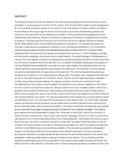| dc.description.abstract | The thesis of this study is that the majority of the educated young adults (25-35 years old) do not fully participate in most programmes of the P.C.E.A. church. They therefore fail to seek counsel and guidance for their personal and social needs from
the church in the vital areas of marriage, vocation and leisure. Nevertheless, at this mature age the church remains central as a source of fellowship,guidance and counsel in the personal life of the educated young adults. This is.so particularly because
parents and teachers have less influence.Chapter one gives an introduction of the study, its objectives and method of research. This study sets out to find out how the P.C.E.A.church,with special reference to Kikuyu Parish, offers pastoral care and counselling to educated young adults. It investigates the personnel involved in pastoral care and guidance, focusing on their training and qualifications. The relationship
existing between pastoral workers and educated young adults is also examined. To achieve these objectives,field interviews with four categories of people were carried out. The first category included key elders and evangelists, parents and women's guild leaders.The second category includedpastors in training. The third category included the educated young adults and lastly the parish ministers and other key informants.
Questionnaires were also sent out to a sample of educated young adults and pastors in training. Published and unpublished materials were also used.Chapter two describes briefly the way traditional Gikuyu society guided the young people into adulthood.This was done in the homestead through the extended family, the age group and the sub clan. The informal educational system was disrupted by the advent of the
missionaries into Gikuyu land. The chapter also includes a brief historical survey of the origin and growth of the P.C.E.A. church. The aim of the missionaries was
to establish a christian way of life among the Agikuyu.The Agikuyu christian converts were required to break immediately from their traditions and to adjust immediately
to new rules and regulations. They did so but went to church for spiritual needs only. Secular problems were not necessarily taken to church for guidance and counselling. Arising from this traditions this study found that today christians take to church only
the needs that require the church minister's ceremonial role.Chapter three looks at Pastoral care and counselling in the parish. The various groups under which pastoral care and counselling is given are described in turn. The main goal of these groups is
to offer pastoral care. The church also organises camps, seminars and annual courses for group leaders.None of these organised camps, seminars and group meetings is able to give personal counselling. In all these it,was found that educated young adults are very few and ih any case the programmes do not deal with their problems at depth.
The training given pastoral workers is discussed in chapter four. Generally in the P.C.E.A. church the training of a church minister involves a two, three or four years course in theology. A church minister may therefore take anyone of the three courses depending on his initial qualification. Other pastoral workers are given shorter courses. The elders' courses are usually not examined. This study finds that except
the church ministers who have qualities to counsel the educated young adults ,the rest of the pastoral workers are not fully trained.Pastoral care and counselling available to the educated young adults is discussed in chapter five.This study finds that the only pastoral care offered is spiritual in the form of worship services and fellowship
meetings. Occasional seminars and the ceremonial functions of the church such as baptism, weddings and funerals are also part of pastoral care offered. The
church does not offer personal counselling services to the young adults in the areas of relationships includinq courtship, love affairs: and family life problems.
It also fails them in leisure and career guidance.In chapter six, five main conclusions are made.Firstly, although educated young adults (25-35years old) are included in the youth fellowship group (15-35 years old), their needs are different from those of 15-23 years old. The majority do not therefore benefit from this fellowship. Secondly, the
majority of the educated young adults lack guidance and counsel from the church in their personal social needs. Thirdly, the training received by the elders,
evangelists and womens guild leaders is too inadequate for effective pastoral care and counselling. The only trained pastoral worker is the church minister who has several other administrative duties in the parish. Being overworked, he lacks enough time for -- personal counselling. Fourthly, the church is enlarging in numbers but not in christian quality. This is so in spite of her target to develop socially, physically,economically and spiritually. Finally most pastoral workers have relaxed their concern for young adults.
thus informants among elders did not seem to be clear about their responsibility for the guidance of young adults.This study recommends, firstly, that inorder to
give educated young adults acccommodation in the church, there is need to establish a young adults ( group) ministry. The existing groups such as youth fellowship do not concern themselves with the individual personal needs of young adults. Secondly, the youth department should provide a trained leader to every parish in the P.C.E.A. to lead the new ministry for young adults. Finally these Parish youth leaders with a special challenge of the educated young adults could organise seminars where the peculiar needs of educated adults cou-ld be discussed. Indi vidual counselling can then be provided through the trained parish youth leaders.Further studies are needed in this area to show how those young adults who are baptised but have apparently no participation in the church can be served. | en |

